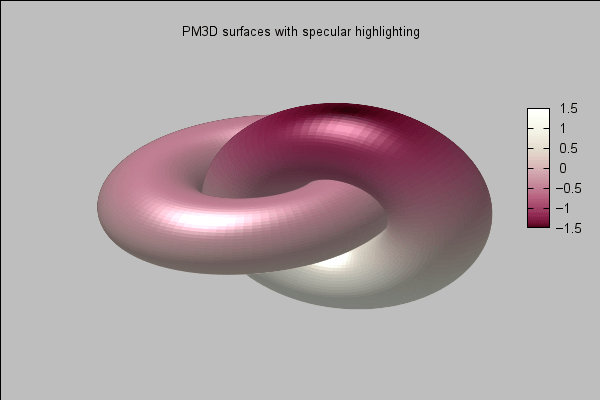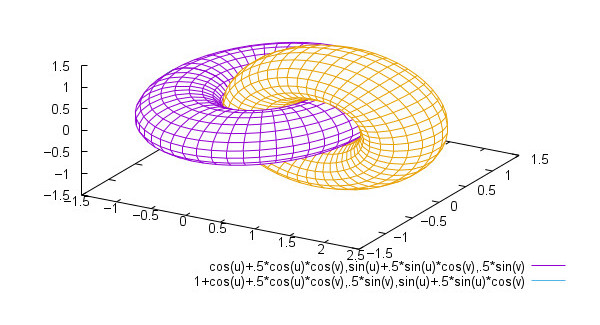gnuplot is an open source command-driven interactive function plotting program. It can be used to plot functions and data points in both two- and three-dimensional plots in many different formats. It is designed primarily for the visual display of scientific data.
This is software for making 2D and 3D graphs from data and functions. gnuplot supports many output formats, including drivers for many printers, (La)TeX, (x)fig, Postscript, and much more.
gnuplot can produce output directly on screen, or in many formats of graphics files, including PNG, EPS, SVG, JPEG and many others. It’s also capable of producing LaTeX code that can be included directly in LaTeX documents, making use of LaTeX’s fonts and powerful formulae abilities. The program can be used both interactively and in batch mode using scripts.
Its data files and self-defined functions can be manipulated by internal C-like language. It can also perform smoothing, spline-fitting, or nonlinear fits, as well as working with complex numbers.
gnuplot is used as the plotting engine of GNU Octave, Maxima and gretl, and it can be used from various scripting languages, including Perl, Python, Ruby and Smalltalk.
Features include:
- Plots any number of functions, built up of C operators, C library functions, library functions, and some things C doesn’t have like **, sgn(), etc. It also has support for plotting data files, to compare actual data to theoretical curves.
- User-defined X and Y ranges (optional auto-ranging), smart axes scaling, smart tic marks.
- TeX-like text formatting for labels, titles, axes, data points.
- User-defined constants and functions.
- Shell escapes and command line substitution.
- Load and save capability.
- Output redirection.
- All computations performed in the complex domain.
- Good support and documentation.
Website: www.gnuplot.info
Support: Documentation, FAQ
Developer: Thomas Williams, Colin Kelley, Russell Lang, Dave Kotz, John Campbell, Gershon Elber, Alexander Woo and many others
License: Open Source
gnuplot is mature software. It has been supported and under active development since 1986.

gnuplot is written in C. Learn C with our recommended free books and free tutorials.
Return to Scientific | Return to Plotting Tools
| Popular series | |
|---|---|
| The largest compilation of the best free and open source software in the universe. Each article is supplied with a legendary ratings chart helping you to make informed decisions. | |
| Hundreds of in-depth reviews offering our unbiased and expert opinion on software. We offer helpful and impartial information. | |
| The Big List of Active Linux Distros is a large compilation of actively developed Linux distributions. | |
| Replace proprietary software with open source alternatives: Google, Microsoft, Apple, Adobe, IBM, Autodesk, Oracle, Atlassian, Corel, Cisco, Intuit, SAS, Progress, Salesforce, and Citrix | |
| Awesome Free Linux Games Tools showcases a series of tools that making gaming on Linux a more pleasurable experience. This is a new series. | |
| Machine Learning explores practical applications of machine learning and deep learning from a Linux perspective. We've written reviews of more than 40 self-hosted apps. All are free and open source. | |
| New to Linux? Read our Linux for Starters series. We start right at the basics and teach you everything you need to know to get started with Linux. | |
| Alternatives to popular CLI tools showcases essential tools that are modern replacements for core Linux utilities. | |
| Essential Linux system tools focuses on small, indispensable utilities, useful for system administrators as well as regular users. | |
| Linux utilities to maximise your productivity. Small, indispensable tools, useful for anyone running a Linux machine. | |
| Surveys popular streaming services from a Linux perspective: Amazon Music Unlimited, Myuzi, Spotify, Deezer, Tidal. | |
| Saving Money with Linux looks at how you can reduce your energy bills running Linux. | |
| Home computers became commonplace in the 1980s. Emulate home computers including the Commodore 64, Amiga, Atari ST, ZX81, Amstrad CPC, and ZX Spectrum. | |
| Now and Then examines how promising open source software fared over the years. It can be a bumpy ride. | |
| Linux at Home looks at a range of home activities where Linux can play its part, making the most of our time at home, keeping active and engaged. | |
| Linux Candy reveals the lighter side of Linux. Have some fun and escape from the daily drudgery. | |
| Getting Started with Docker helps you master Docker, a set of platform as a service products that delivers software in packages called containers. | |
| Best Free Android Apps. We showcase free Android apps that are definitely worth downloading. There's a strict eligibility criteria for inclusion in this series. | |
| These best free books accelerate your learning of every programming language. Learn a new language today! | |
| These free tutorials offer the perfect tonic to our free programming books series. | |
| Linux Around The World showcases usergroups that are relevant to Linux enthusiasts. Great ways to meet up with fellow enthusiasts. | |
| Stars and Stripes is an occasional series looking at the impact of Linux in the USA. | |
